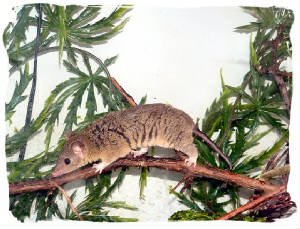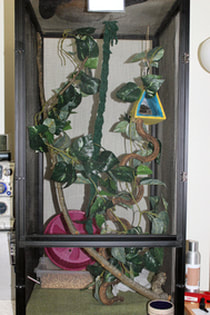General Information:
The Brazilian short-tailed opossum is not uncommon within the exotic pet trade; they breed readily in captivity and have been used extensively in research. They're sometimes mistaken for rodents, but they're nocturnal marsupials in the family Didelphidae; like all marsupials, their young develop outside of the uterus. They have some interesting characteristics; despite being a marsupial, they do not have a pouch in which they carry their young. Interestingly, the young latch on to a nipple on their Mother's abdomen until they're more developed. They also have a sparsely-haired prehensile tail which is used to hold onto various items and assist them with climbing and building their nests which are usually in hollow logs on the ground.
There are considered to be more than 20 species referred to as the 'short-tailed opossums', but the most commonly kept with the one we're referring originating from Brazil; scientifically referred to as Monodelphis. They're found throughout Brazil, Bolivia, Argentina, and Paraguay.
They live between 4-8 years old in captivity.
Care:
Housing/Enrichment:
It's very important that whatever housing you choose for your opossum, bar spacing must be no larger than 0.5inches as they're known for being escape artists. You really cannot go too big when considering a cage for your pet, most people recommend multi-story rat/ferret cages - avoid wire flooring.
Alternatively, some people recommend very large aquariums or reptile habitats such as Exo Terras. Ensure there is adequate ventilation
Short-tailed opossums love to climb, forage and exercise. Consider enrichment such as ropes, bridges, branches. hammocks, ladders, tubes, a large metal exercise wheel, and similar items.
You can add a litter tray to your enclosure as short-tailed opossums will usually go to the toilet in the same place.
The Brazilian short-tailed opossum is not uncommon within the exotic pet trade; they breed readily in captivity and have been used extensively in research. They're sometimes mistaken for rodents, but they're nocturnal marsupials in the family Didelphidae; like all marsupials, their young develop outside of the uterus. They have some interesting characteristics; despite being a marsupial, they do not have a pouch in which they carry their young. Interestingly, the young latch on to a nipple on their Mother's abdomen until they're more developed. They also have a sparsely-haired prehensile tail which is used to hold onto various items and assist them with climbing and building their nests which are usually in hollow logs on the ground.
There are considered to be more than 20 species referred to as the 'short-tailed opossums', but the most commonly kept with the one we're referring originating from Brazil; scientifically referred to as Monodelphis. They're found throughout Brazil, Bolivia, Argentina, and Paraguay.
They live between 4-8 years old in captivity.
Care:
Housing/Enrichment:
It's very important that whatever housing you choose for your opossum, bar spacing must be no larger than 0.5inches as they're known for being escape artists. You really cannot go too big when considering a cage for your pet, most people recommend multi-story rat/ferret cages - avoid wire flooring.
Alternatively, some people recommend very large aquariums or reptile habitats such as Exo Terras. Ensure there is adequate ventilation
Short-tailed opossums love to climb, forage and exercise. Consider enrichment such as ropes, bridges, branches. hammocks, ladders, tubes, a large metal exercise wheel, and similar items.
You can add a litter tray to your enclosure as short-tailed opossums will usually go to the toilet in the same place.
Socialising:
Short-tailed opossums are solitary animals and should not cohabit whatsoever.
They're typically very docile, friendly, and inquisitive.
Please take care when handling them as they do have very sharp teeth and may bite when mishandled - like most animals.
Diet:
Providing a suitable diet can be considered the most difficult part of short-tailed opossums care. Typical of marsupials, they have a lower metabolic rate than that of placental mammals.
Dry food should be available at all times. There are some commercially available dry foods for opossums depending on your location. Otherwise, there are several alternatives:
Here are some available diets fed in zoos for inspiration:
Diet 1 (adapted from the National Zoo, Washington DC, USA):
Diet 2 (Johnson-Delaney and Ness, in press):
Please feel free to ask more questions.
Short-tailed opossums are solitary animals and should not cohabit whatsoever.
They're typically very docile, friendly, and inquisitive.
Please take care when handling them as they do have very sharp teeth and may bite when mishandled - like most animals.
Diet:
Providing a suitable diet can be considered the most difficult part of short-tailed opossums care. Typical of marsupials, they have a lower metabolic rate than that of placental mammals.
Dry food should be available at all times. There are some commercially available dry foods for opossums depending on your location. Otherwise, there are several alternatives:
- Insectivore diet
- Cat pellets
- Ferret pellets
- Fox pellets (preferred)
- High protein
- Low fat
Here are some available diets fed in zoos for inspiration:
Diet 1 (adapted from the National Zoo, Washington DC, USA):
- 5 g of a blended meat mixture comprising: 225 g chopped, cooked lean meat (horse or beef)
- 1 hard-boiled egg
- 15 g wheat germ flakes
- 10 g powdered milk 2.5 g powdered multivitamin/mineral supplement.
- This mixture is supplemented daily with: 1 cm cube of fresh fruit (kiwi, orange, apple, grape, banana) 1 cm cube of commercial marmoset diet 1or 2 calcium gut-loaded crickets, 6 small mealworms OR two king mealworms OR 10 small mealworms. Note: adult insects are more nutritious than larval forms.
Diet 2 (Johnson-Delaney and Ness, in press):
- 5g commercial insectivore diet (hedgehog dry kibble or semi-moist zoo insectivore diet)
- 2.5 g cooked meat (turkey, chicken, beef, deboned fish) sprinkled with powdered multivitamin/mineral supplement
- 1 cm cube of fresh fruit (kiwi, orange, apple, grape, banana) sprinkled with powdered multivitamin/mineral supplement 1 or 2 calcium gut-loaded crickets
- 1 large mealworm and 6 small mealworms OR 2 large mealworms OR 10 small mealworms. Note: adult insects are more nutritious than larval forms
- In addition, 3–5 times a week: 1.25 g hard-boiled egg (chop white and yolk together, sprinkle with vitamin/mineral supplement) 1.25 g cottage cheese or skim-milk cheese
Please feel free to ask more questions.



